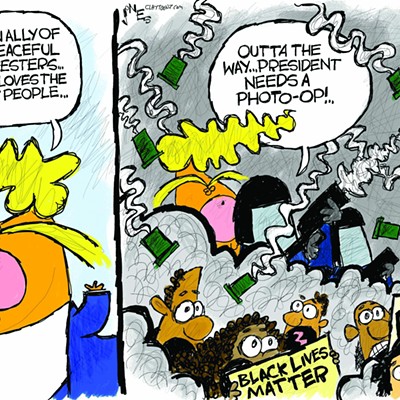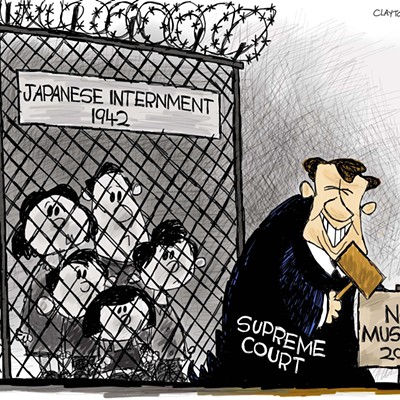It was a hopping night at Petland as Chihuahuas danced about, a little Labrador relieved himself, and a tiny dachshund battled his blanket while customers gawked through thick Plexiglas.
It was a far cry from a few days earlier, when an angry crowd picketed the store on East Broadway Boulevard. They were protesting Petland's business of selling puppies to a community awash in unwanted animals.
Among the protesters was Katherine Moore, who tells the Tucson Weekly that her "personal reason for picketing is that I believe it is unethical to breed and ship puppies here from other states, when there are dogs dying every day in Arizona because they can't find loving homes or the care they need."
But it wasn't just a surplus of animals that had the crowd upset. On March 16, officials from the Humane Society of the United States joined a class-action lawsuit against Petland Inc., and its puppy supplier, the Missouri-based Hunte Corporation. The suit alleges that Petland and Hunte conspired to sell sick puppies supplied by so-called puppy mills, while telling customers the animals were procured only from high-quality breeders.
The mills, mostly scattered around the Midwest, are notoriously huge operations where hundreds of breeding dogs are kept in cramped cages, rarely seeing the light of day as they churn out litter after litter. Puppies produced this way can suffer from genetic defects and infectious diseases.
But Peter Sher, owner of Tucson's two Petland franchises, claims the Humane Society is barking up the wrong tree.
"I buy from probably 100 breeders from all over the country—the same breeders that I've been buying from for five years," he says. "I've sold 6,000 puppies in the community of Tucson, with an extraordinarily high level of customer satisfaction."
Checking with the Better Business Bureau of Southern Arizona, however, reveals a slightly different picture. According BBB reports, both of Sher's stores score a resounding "F," with complaints about a failure to honor contracts and issues with products, refunds or exchanges. In nearly all of those cases, Sher's stores didn't even respond to the bureau's requests for mediation.
That does not surprise Kathleen Summers, director of the HSUS Stop Puppy Mills campaign. "A lot of the people who are contacting us in the wake of the lawsuit being filed are saying that the stores they were involved with were not adhering to their promises."
Those promises include providing puppies that are healthy and well-socialized.
Prior to its lawsuit, the HSUS conducted an eight-month investigation of 21 Petland stores and 35 breeders providing puppies to the chain. It also sifted through the records of 322 more breeders, and tracked nearly 18,000 puppies dispatched to the stores. What emerged, according to the HSUS Web site, was an industry in which puppies are treated as a "cash crop" by huge commercial breeders, and "hundreds of breeding dogs are packed into cramped, barren cages—often for their entire lives, with no socialization, exercise or human interaction."
While Sher claims to buy only from the finest breeding operations, he admits he hasn't inspected most of them himself. "It's just not practical for me to go visit 100 breeders around the country," he says. "But I do substantial due diligence on them, through references and such."
Like many other Petland outlets, his stores obtain many of their puppies from the Hunte Corporation, which serves as a broker between breeders and retailers.
Hunte president Steven Rook says his business operates in the stratosphere of integrity. But Hunte receives an "F" rating from the Southwest Missouri Better Business Bureau for failing to address customer complaints, much like Sher's stores.
Nor can Rook pinpoint which breeders actually supply puppies to the Tucson stores. "But there are only two acceptable sources for our puppies at the Hunte Corporation," he says. They include small-time "hobby breeders" and "USDA-registered and licensed and inspected breeders."
He refuses to provide their names, however. "I don't give out any breeder information to the press," he says.
Still, he emphasizes that the U.S. Department of Agriculture is diligent about inspecting the larger breeders. "The (USDA) is required to by law. And if they find that there is something that should be repaired to improve the quality of the facility, they give that breeder 30 or 40 days to fix that."
But consider that there are only about 100 USDA inspectors to monitor 10,000 facilities across the country, raging from research labs to zoos. Many even consider the agency's standards abysmal: federal guidelines currently allow a medium-sized terrier to be kept in a cage the size of a clothes drier for its lifetime.
Summers says USDA inspectors must adhere to the federal Animal Welfare Act, which is hardly the gold standard for compassion. For instance, "the act doesn't say that you can't have 300 dogs living in cages their whole lives. They'll never get taken for a walk. They'll never be part of a family. Nobody gives them personal attention. As long as they have food and water and space to turn around," the breeder can pass USDA muster.
"The other thing we found, as part of our investigation, is that the USDA-licensed breeders we checked on which were linked to Petland had significant violations of even those basic care standards in their inspection reports."
Summers' bottom line: "The USDA standards are very minimal, and just adhering to those standards doesn't prove that a breeder isn't a puppy mill."
During a surreptitious visit to Sher's Tucson store on Broadway, the sales clerk did show us paperwork on three puppies, which revealed breeders in far-flung states. But whether those breeders were puppy mills seemed impossible for customers to easily determine.
So picking a puppy from Petland appears to be a case of caveat emptor—or buyer beware.
If the Better Business Bureau is any gauge, some Petland customers have already learned that lesson the hard way.












